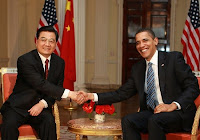 Originally posted at the Breakthrough Institute
Originally posted at the Breakthrough Institute
Speeches made today at the UN's climate summit may have left much to be desired in the eyes of countries eagerly hoping for the U.S. and China to make specific commitments to emissions reductions in the run-up to climate negotiations in Copenhagen. Yet, willingness on the part of both nations to invest in clean energy technology may signify more direct action to mitigate climate change than any potentially empty emissions promises.
In his speech this morning, China's President Hu Jintao did not agree to binding carbon emissions targets, however, according to the New York Times, he did outline a four step plan that includes reducing the carbon intensity of the economy to 2005 levels by 2020, boosting nuclear and renewables to account for 15% of China's power, increasing forest cover, and furthering action to develop a green economy. According to the UN Climate Change Conference website, Hu promised to cooperate on climate change efforts so long as they aligned with China's ambitious development goals:
"Climate change is an environment issue, but also, and more importantly, a development issue. We should and can only advance efforts to address climate change in the course of development...Out of a sense of responsibility to the world...China has taken and will continue to take determined and practical steps to tackle this challenge,"
While international leaders have put considerable effort into cajoling China, not to mention India, to accept binding emissions reductions targets by the time climate negotiations commence in Copenhagen this December, China's planned stimulus investment of $440-$660 billion in clean energy over the next ten years is far more indicative of China's willingness to mitigate climate change as it simultaneously grows its own economy.
China is already the world's leading solar manufacturer and the government has announced plans to instate a feed-in tariff for solar electricity. In the last month alone, the Chinese government has announced a deal with First Solar to build a 2 GW solar power plant, the world's largest, and offers significant subsidies and incentives to its other clean energy sectors, promoting their rapid expansion.
Though it already leads the world in carbon emissions, China's investments in clean energy to mitigate and eventually supplant its dependence on fossil fuels, primarily coal, are more direct measures to fight climate change than emissions targets, which have not been proven achievable by Kyoto Protocol signatories attempting to meet them for the last decade.
The U.S. has also received considerable criticism from the international community demanding a firm stance and leadership from the Obama administration by the time climate negotiations commence. Obama's speech this morning, which dubbed the climate change threat "serious," "urgent," and "growing," did little to quell international disappointment.
With the House-passed climate bill, ACES, awaiting a delayed Senate decision, Obama was not in a position to commit the U.S. to binding emissions caps, either. He did, however, emphasize recent U.S. investments in clean energy as a result of the American Recovery and Reinvestment Act (ARRA) such as two-year cash grants totaling $3 billion that are spurring clean energy development, even if it is only in the short-term:
"We are making our government's largest ever investment in renewable energy -- an investment aimed at doubling the generating capacity from wind and other renewable resources in three years. Across America, entrepreneurs are constructing wind turbines and solar panels and batteries for hybrid cars with the help of loan guarantees and tax credits -- projects that are creating new jobs and new industries."
Reaching a global climate treaty in Copenhagen seems to be contingent on global acceptance of binding emissions targets, but critics who claim both the U.S. and China are not taking action on climate change, discount the critical importance of their investments in clean energy. While emissions targets may symbolize direct action against climate change, without the kind of direct investments to transform the way nation's make and use energy already begun in China and the U.S., these "commitments" will prove empty - just another "magical" solution to a problem whose scale requires making clean energy cheap and massively shifting the world's energy supply toward low-carbon sources of energy.













No comments:
Post a Comment